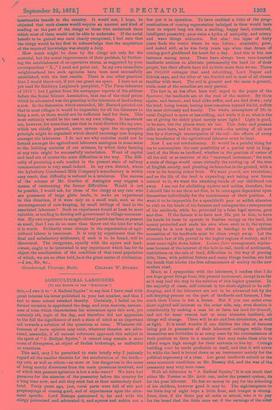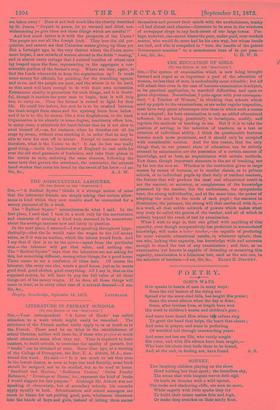AGRICULTURAL LABOURERS.
[TO THE EDITOR, OF THE "SPECTATOR.")
owe it to "A Radical Squire" to say that I have read with great interest his letter published in your last number, and that I feel to some extent rebuked thereby. Certainly, I failed on the former occasion to apprehend the deep, and even anxious, earnest- ness of tone which characterises his utterances upon this new, yet certainly old, topic of the day, and therefore did not appreciate to the full the significance of such a state of mind as an important aid towards a solution of the questions at issue. Whatever dif- ferences of mere opinion may exist, whatever theories are advo- cated, assuredly, if all earnest reformers approach this subject in the spirit of "A Radical Squire," it cannot long remain a mere cause of divergence, an object of foolish bickerings, as unfruitful as vexatious.
This said, may I be permitted to state briefly why I jealously regard all the smaller theories for the amelioration of the hinds— my own as well as others—as more or less dangerous in the sense of being merely diversions from the main questions involved, and of which this peasant agitation is but a side-wave? We have had panaceas for the miseries of the peasantry before the country for -a long time now, and still they stick fast at their melancholy dead- level. Forty years ago, just, rural parts were fall of stir and prophesyings of coming good, and of experiments upon the allot- ment specific. Lord Bishops patronised it, far and wide the clergy patronised and advocated it, and squires and nobles not a ' few put it in operation. To have credited a tithe of the prog- nostications of coming regeneration indulged in then would have been to expect long ere this a smiling, happy land, contented, intelligent peasantry, poor-rates a hydra of antiquity, and misery and want things unknown. But alas ! the lapse of forty years finds the rustic where he was before ; miserable, poor, and naked still, as he was forty years ago when that dream of coming good gladdened his heart for a day. And this is but one instance among many. There have always been true-hearted landlords anxious to alleviate permanently the hard lot of their people, but their efforts have led to little more than we see. There are 700,000 cottages that need rebuilding, Lord Napier and Ettrick says, and the tiller of the fruitful soil is most of all classes familiar with want. The evil is general and the cause is general, while most of the remedies are only partial.
The fact is, as has often been well urged in the pages of the .Spectator, the landlords are at the root of the matter. By them squire, and farmer, and hind alike suffer, and are tied down ; only the hind, being lowest, having least resources beyond his lot, suffers the most obviously and keenly. The whole atmosphere of life in rural England is more or leas stifling, and while it is so, what is the use of giving the sickly plant merely more light? Light is good, to be sure, but the plants want air too. This duke and peasant alike must have, and to this great work—the setting of all men free by a thorough emancipation of the soil—the efforts of every true benefactor of the agricultural labourer must be bent.
Now I am not revolutionary. It would be a painful thing for me to contemplate the near possibility of a partial trial in Eng- land of the State as landlord, whether in the position of owner of all the soil or as receiver of the " increased increment," for such a state of things would mean virtually the rooting-up of the tree of English society, and planting its branches in the ground, with a view to its bearing richer fruit. We want growth, not revolution; and as the life of the land is expanding and taking new forms natural to it, we want the swathing-bands of our childhood cut away. I am not for abolishing squires and nobles, therefore, but I should like to see them set free, to be once again dependent upon themselves individually for the maintenance of their position. I want it to be impossible for a spendthrift peer or selfish absentee to visit on the heads of his farmers and cottagers the consequences of his misdeeds, while he, protected by a false legal system, goes scot-free. If the farmer is to have new life put in him, to have his hands let loose to operate in fearless energy on the land, his money protected and made his own when sunk in it, the system whereby he is now kept too of ten in bondage to the political necessities of his landlords must be clean swept away. Let the economic law of life prevail in the higher regions of society, and it must come right down below. Laissez-faire management, supine- ness because of the interest of the heir-in-tail, deeds of settlement, restrictions on the sale of land, difficulties in the way of proving title, these, with political fetters and many things besides, are but the bonds that hinder the free advancement of society on the new modern road.
Much as I sympathise with the labourers, I confess that I do not hope great things from this present movement, except in so far as it may lead the way to the solution of this higher question. In the majority of cases, self-interest is too short-sighted to be self- denying, and if the labourers are not to be advanced but by the self-denying process on the part of landlords and farmers, I fear much their Union is but a dream. But if you can enlist even short-sighted self-interest on the other side, nay, even shorten it considerably by making a man let or farm his land for himself, and not for some remote heir or some absentee landlord, all things will change. There will be air and free circulation, as well as light. It is small wonder if one dislikes the idea of farmers being put in possession of their labourers' cottages while they themselves are forbidden in so many cases by the circumstances of their position to farm in a manner that may make them able to afford wages high enough for their servants to live by. Cottage building must be made profitable in itself, and that it will never be while the land is bound down as an instrument mainly for the political supremacy of a class. Let great landlords submit to the same economic conditions as Mr. Braesey did, and the war of the peasantry may very soon cease.
With all deference to "A Radical Squire," it is not much that either Mr. Forster or Mr. Arch can, under the present system, do for the poor labourer. He has no money to pay for the schooling of his children, however good it may be. The eighteenpenoe to the little boy of eight buys a little flour, and hunger is strong. Even, then, if the State pay all coats at school, who is to pay for the bread that the little ones eat if the earnings of the elder
are taken away ? Does it not look much like the charity described by St. James, " Depart in peace, be ye warmed and filled, not- withstanding ye give them not those things which are needful ?"
And how much better is it with the prospects of the Union ? The people are not all like Joseph Arch. They love the old per- quisites, and cannot see that Unionism means giving up these yet. But a fortnight ago, in the very district where the Union move- ment began, I saw crowds of women abroad in the fields " leasing," and in almost every cottage that I entered bundles of wheat-ears lay heaped upon the floor, representing in the aggregate a con- siderable portion of the farmer's crop. Where are they, again, to find the funds wherewith to keep the organisation up ? It needs some money for officials, for printing, for the travelling agents, and so on, and the people are poor, and the winter is to be hard, so that most will have enough to do with their own necessities. Extraneous charity is precarious for such things, and it is doubt- ful, though it enables the poor man to begin, that it will help him to carry on. Then the farmer is roused to fight for dear life. He could live before, but now he is to be crushed between the dead-weight from above and the uprising force from below ; and if he is to die, he means, like a true Englishman, to die hard. Organisation is his already to some degree, machinery offers him, in many cases, a substitute for hand-labour that he is not slow to avail himself of,—as, for instance, when be thrashes out all his crops by steam, without even stacking it, in order that he may be able to turn his men off in winter. Except to increase misery, therefore, what is the Union to do ? It can do but one really good thing,—incite the landowners of England to cast aside for ever the old steel garments of feudalism, and take their places in the nation as men, enduring the same chances, following the same laws that govern the merchant, the contractor, the meanest hand-worker that earns his bread by the sweat of his brow.—I am



































 Previous page
Previous page